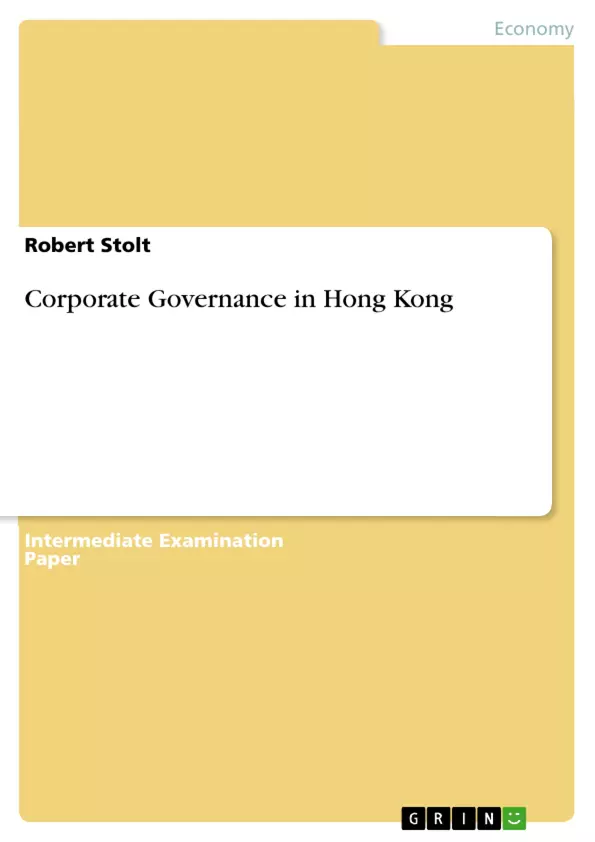Corporate Governance (CG) has always been a critically viewed topic and is being increasingly discussed after the Enron and WorldCom scandals, which had a worldwide outreach (Petra, 2006, p. 107) or major cases of poor corporate governance in Asia such as the Peregrine or the CA Pacific Securities Case in the 1990s. On this account, stricter rules have been introduced and existing regulations were re-examined in many markets in order to restore the public confidence in corporate governance systems and the transparency and accountability of organisations.
The corporate governance system in Hong Kong is characterised by unique features differing from the Anglo-American framework. The extensive amount of family-controlled companies and mainland firms would suggest a deficient corporate governance system. In spite of this, a study by Nan, Kang and Kim (1999) comparing corporate governance among Asian economies indicated that Hong Kong has significantly higher corporate governance standards and equally more sophisticated legal systems governing the protection of property rights than other countries in that area.
As regard to the structure of this coursework, initially, the general theoretic foundations of corporate governance are explained in chapter two. Thereafter, the specifics of the market in Hong Kong will be examined, comparing the development of global corporate governance to the development in Hong Kong. It is also explained why transplanted British and American laws and regulations seem ineffective. Chapter 4.1 then analyses the composition of shareholders in Hong Kong, answering the question as to why there is only a small number of minority shareholders actively participating in corporate governance. In chapter 4.2, it will be discussed whether minority shareholders are successful in confronting the current system. Chapter five gives recommendations on how to establish a corporate governance system tailored to Hong Kong and Asian emerging markets more broadly. Finally, in a retrospective analysis of the paper, the research findings will be analysed and an outlook of the future development of corporate governance in Hong Kong will be given.
Inhaltsverzeichnis (Table of Contents)
- Introduction
- Definition of Corporate Governance
- Characteristics of Corporate Governance (and Regulation) in Hong Kong
- Composition of Shareholders in Hong Kong
- The role of Minority Shareholders
- The Minority Shareholders' Battle Against Prevailing Norms
- Recommendations for a Hong Kong Corporate Governance System
- Conclusion and Outlook
Zielsetzung und Themenschwerpunkte (Objectives and Key Themes)
This essay examines the unique characteristics of the corporate governance system in Hong Kong, analyzing its differences from the Anglo-American framework and its effectiveness in addressing challenges posed by the prevalence of family-controlled companies and mainland firms. It explores the role of minority shareholders in influencing corporate governance and assesses the success of their efforts to confront the prevailing norms. The essay ultimately aims to provide recommendations for establishing a corporate governance system tailored to Hong Kong and other emerging markets in Asia.
- Corporate governance in Hong Kong compared to Anglo-American frameworks
- The impact of family-controlled companies and mainland firms on corporate governance
- The role and influence of minority shareholders in corporate governance
- Challenges to effective corporate governance in Hong Kong
- Recommendations for tailoring corporate governance systems to emerging markets
Zusammenfassung der Kapitel (Chapter Summaries)
- Introduction: This chapter provides an overview of the importance of corporate governance and introduces the case study of David Webb, a shareholder activist in Hong Kong. It highlights the unique characteristics of the Hong Kong corporate governance system and its comparison to other Asian economies.
- Definition of Corporate Governance: This chapter defines corporate governance and discusses its theoretical foundations, providing a framework for understanding the subsequent analysis.
- Characteristics of Corporate Governance (and Regulation) in Hong Kong: This chapter examines the specific characteristics of corporate governance in Hong Kong, comparing its development to global trends and analyzing the effectiveness of transplanted British and American laws and regulations.
- Composition of Shareholders in Hong Kong: This chapter analyzes the composition of shareholders in Hong Kong, exploring the reasons behind the limited participation of minority shareholders in corporate governance.
- The Minority Shareholders' Battle Against Prevailing Norms: This chapter discusses the success of minority shareholders in challenging the current system of corporate governance in Hong Kong.
Schlüsselwörter (Keywords)
The key topics of this essay include corporate governance, shareholder activism, family-controlled companies, minority shareholders, emerging markets, and the development of legal and regulatory frameworks for corporate governance in Hong Kong.
Frequently Asked Questions
How does Corporate Governance in Hong Kong differ from the West?
Hong Kong's system is characterized by a high number of family-controlled companies and mainland firms, which differs significantly from the Anglo-American framework.
Are Corporate Governance standards in Hong Kong considered high?
Yes, studies indicate that Hong Kong has significantly higher standards and more sophisticated legal protection for property rights compared to other Asian economies.
Who is David Webb in the context of Hong Kong's market?
David Webb is a prominent shareholder activist in Hong Kong who challenges prevailing norms and advocates for minority shareholder rights.
Why do minority shareholders in Hong Kong face challenges?
The dominance of family-controlled structures often limits the active participation and influence of minority shareholders in corporate decision-making.
What are the recommendations for improving the system?
The essay suggests establishing a governance system specifically tailored to the unique needs of Hong Kong and other Asian emerging markets rather than just transplanting Western laws.
- Quote paper
- Robert Stolt (Author), 2009, Corporate Governance in Hong Kong, Munich, GRIN Verlag, https://www.grin.com/document/145042



